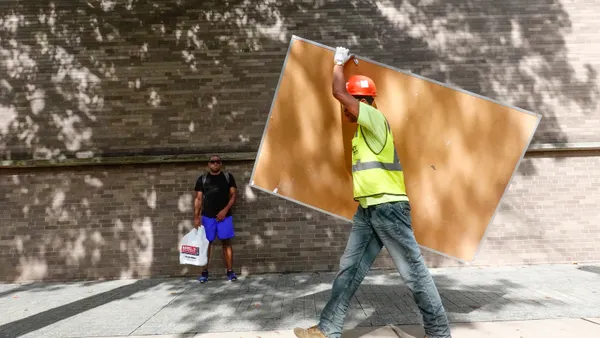When managers at Camarata Masonry Systems in Houston recently had suspicions that phones were contributing to safety issues and a lack of productivity on jobsites, one of the company's superintendents decided to test out the theory. He gathered cellphones from employees as they reported to the jobsite one day and held on to them until lunchtime, Camarata Safety Director Robert Brown told Construction Dive.
When he handed the phones back to workers, he asked two employees to share the number of notifications they had received, including emails, texts, phone messages and social media alerts. One worker reported he had 60 and the other had more than 100.
That amount of constant interruptions over just a few hours shocked Camarata leaders.
“Imagine if the employee pulled out his phone every time that ding or buzz went off,” said Brown. “Construction sites are dangerous enough as it is, with the cellphone epidemic now adding to the everyday hazards and challenges we face.”
A recent Construction Dive article about the dangers of personal cellphone use on the jobsite sparked an outpouring of comments about this issue. While a few readers noted that mobile phones can be useful communication tools, the overwhelming majority said they are a growing nuisance both on site and in the office. Here are some of the comments contractors made:
- “They're a distraction that compromises safety and production.”
- “A long-standing, chronic issue.”
- “The No. 1 factor in falling productivity and costs.”
- “A huge safety liability that is becoming more obvious and hard to police.”
- “A dangerous distraction.”
- “People are addicted, it is like a drug.”
- “The elephant in the room when it comes to productivity, safety, privacy and confidentiality on building construction jobsites.”
- “It’s something we have noticed becoming an issue and wondered if others are also.”
Their observations revealed that cellphone use presents construction firms with a range of issues. In fact, 85% of the contractors who responded to an informal Construction Dive survey said that phone usage is a problem. Texting, social media and talking while on the job are the top offenders

Construction pros responding to the cellphone article said the main concern with the use of devices on the job is its ability to compromise worker safety, and they provided many examples of the dangerous situations that have arisen from phone-related distractions. Readers reported that they have witnessed workers actively engaged on their devices while on ladders, scissor lifts and working with heavy equipment.
One respondent recalled a worker who walked off the edge of a roof while talking on the phone. Luckily his harness prevented major injuries, but “the situation could have been fatal,” he said.
Construction company owners and managers are worried about liability issues, with some wondering who bears the responsibility when a worker gets injured because he or she wasn’t paying attention. They argued that workers should take responsibility for their own safety.
“Companies should not be held responsible for distracted workers who are not paying attention and hurting themselves,” said Ray Cloud, president of R. Cloud Construction in Lake Charles, Louisiana.
Aside from safety issues, cellphones represent a never-ending diversion that often leads to a loss of productivity, readers said. Steven Imburgia, president of Houston-based construction and engineering consultancy Imburgia Consulting, told Construction Dive that the biggest issue with cellphones is that workers feel they should have unrestricted use of them. The number of hours they spend on their phones while at work is staggering, he said.
“Today employees feel it is fine to be on the phone taking care of personal business without any boundaries,” he said. “This includes talking to friends and family, texting unrelated to work, checking and posting on Facebook, all on company time, which results in a huge loss of productivity.”
He pointed out that phones on jobsites can also create problems related to confidentiality, because they allow workers to take photos, videos or audio recordings that haven’t been approved.
“In my state you do not have to have someone’s permission to record a conversation, so do we have to take the position that every discussion is being recorded?” Imburgia asked.
Set clear rules and offer training
Safety managers and superintendents who recognize the problems created by cellphones have taken steps to respond to the issue: 68% of respondents to the Construction Dive survey said that their companies have some type of policy overseeing their use.
Greg Sizemore, the Associated Builders and Contractors' vice president of Workforce Development, Safety, Health and Environmental, told Construction Dive that many ABC members have rules forbidding the use of cellphones on jobsites. He urges contractors to train their employees on the appropriate use of technology in and around the jobsite and tells pros to bring the topic up in toolbox talks and other company meetings.
“The idea is to eliminate the conditions for any incident or accident to occur so employees can go home safe,” he said.
For instance, Brian Harris, a Barton Malow senior project safety manager in Ann Arbor, Michigan, said that he has a strict policy about the dangerous practice of listening to music or podcasts on site.
“I make it very clear in orientation that the use of earbuds, or a Bluetooth headset worn around the neck, will get you escorted to the gate immediately,” he said. “It’s a zero tolerance policy.”
The ramifications for not following company policy run the gamut according to our survey, from warnings to a reduction in pay to fines and termination. While safety managers and superintendents said they want to be tough on offenders, they have to be practical in this tight market for skilled labor.
“You can issue a warning then a termination and eventually you have no workers,” said Cloud.
Create a zero tolerance policy
Although OSHA has no specific regulation regarding the use of cellphones on the jobsite, Sizemore’s stance is that cellphone use of any kind should not be allowed on active construction sites or while driving to and from sites.
A blog post by the Vanner Insurance Agency, which works with builders, notes that OSHA can cite employers for violating the General Duty Clause, which states the need for a workplace free from hazards. To meet this requirement, according to Vanner, employers should make construction sites cellphone-free zones, and post signs in designated areas to remind workers of this policy. Workers should only have access to their cellphones during break periods and in designated areas.
"There is a space and place for technology in our workplace but it has to be relevant to the task and safe," Sizemore said. "It's just not wise to allow something into an environment where it has no place and/or it creates the condition for you or someone else to be injured."














